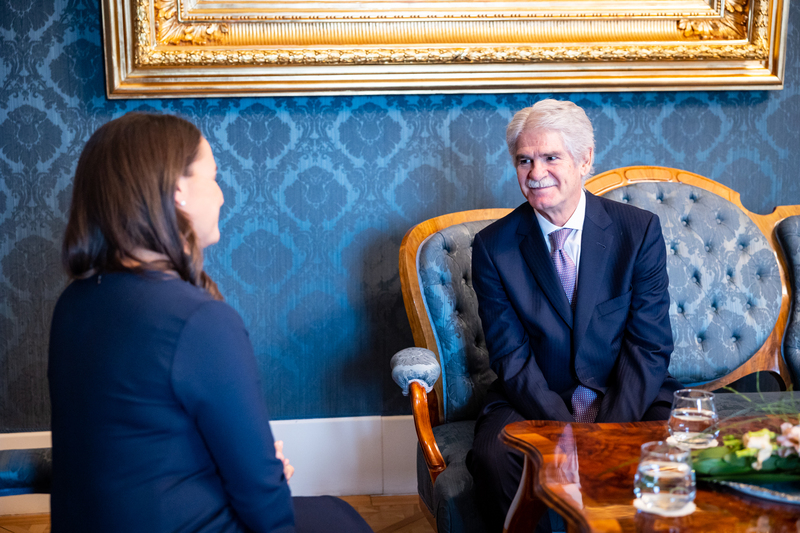Change language:
Gastronomy, culture, Puskás – Interview with the Ambassador of Spain in Budapest

We interviewed H. E. Ambassador Alfonso Dastis, the ambassador of Spain in Budapest. We talked about his first impressions of Hungary and the Hungarian language, the economic, cultural and touristic ties between the two countries and, of course, we did not miss the two countries’ world-famous gastronomic heritage and Ferenc Puskás, one of the world’s best footballers, who is respected in Madrid, too.
DNH: You have just arrived in our country. Can you tell us about the missions you have been involved in during your career?
H. E. Ambassador Alfonso Dastis: My career has concentrated almost exclusively on Europe, with the exception of a stint at the Spanish mission to the United Nation in New York. I have been Ambassador to the Netherlands, Permanent Representative of Spain to the European Union in Brussels and Ambassador to Italy before becoming Spanish Ambassador to Hungary. In Madrid I have held several high ranking positions, such as European advisor in the Prime Minister’s office, Director of Organization of the Spanish Presidency of the EU in 2002, Secretary General for European affairs at the Spanish foreign Ministry and finally Foreign Minister between 2016-2018.
DNH: Before your arrival, did you have any contacts or experiences with Hungary? Have you been here before?
H. E. Ambassador Alfonso Dastis: I had been only to Budapest, which I had visited a couple of times, the first one in 1988, the second in 2011 during the Hungarian presidency of the EU.

DNH: And now that you live here, what is your first impression of Budapest, Hungary and Hungarians?
H. E. Ambassador Alfonso Dastis: So far I have concentrated mostly in Budapest, which is truly a beautiful city. From the sites on hills on the Buda side to the monuments on Pest, there is a lot to explore and discover. I have also visited Debrecen, Miskolc and Veszprem, which is the cultural capital of Europe this year, but I intend to travel extensively throughout Hungary to experience the richness and diversity of this great country.
As for my experience with people: At first, you get the impression that Hungarians aren’t very talkative and they come across as reserved. Besides, communication can be difficult if you do not speak Hungarian because of the language barrier. But they are polite and respectful and when you get to know them, they are very friendly. And in above all, my institutional interlocutors, both at the national and local level, have always been very accessible, welcoming and willing to help.

DNH: How would you describe Hungarian-Spanish intergovernmental relations? When was the last time there was a prime ministerial or ministerial meeting between the two countries? And is there a high-level meeting scheduled for this year?
H. E. Ambassador Alfonso Dastis: The year 2022 marked the 45th anniversary of the reestablishment of diplomatic relations between Spain and Hungary. Bilateral relations are traditionally good, without disputes, and are anchored in the common membership of the EU and NATO. The Minister of Foreign Affairs and Trade of Hungary, Mr. Szijjártó paid three official visits to Spain between 2020 and 2021: In October 2020 and November 2021 he attended a meeting of the Union for the Mediterranean (UfM), in Barcelona. On June 28 he also attended the NATO Summit in Madrid, together with PM Orbán and the Minister of Defense, Mr. Szalay-Bobrovniczky. The last visit to Budapest of a Spanish Minister for Foreign Affairs was that of Mr. Josep Borrell In December 2018. In July 2022, the Secretary General of the EU, María Lledó, visited Budapest, followed by a visit by the Secretary of State for the European Union, Pascual Navarro, in November. The latter two took place in the context of the preparation of the Trio of Presidencies of the Council of the European Union, that will be held by Spain, Belgium and Hungary between July 2023 and December 2024.
DNH: On the economic front, we know that there are many Spanish companies in Hungary. Which are the biggest ones?
H. E. Ambassador Alfonso Dastis:
1. Audax Renewables Kft. (Energy)
2. Gestamp-Hungária Kft. (Automotive sector)
3. Inditex Magyaország Kft. (Fashion chain)
4. F. Segura Hungária Kft. (Automotive sector)
5. Antolin Hungary Kft. (Automotive sector)
6. Tokaj-Oremus Kft. (Wine cellar)
7. FCC Hungaria Kft. (Waste management)
As you see, they are concentrated mostly on the automotive sector, energy and infrastructure. There are also several hotel chains mainly in Budapest.

DNH: And which Hungarian companies can make their mark in Spain? And which Hungarian goods have made a name for themselves in your country?
H. E. Ambassador Alfonso Dastis:
- Gedeon Richter Ibérica SA, pharmaceutical products.
- Vertis Iberica SA, metallurgical items.
Hungary exports to Spain amounted to 3 billion euros until November 2022. Mainly components for cars and other minor industrial items. From the import side Hungry received from Spain car components and other minor industrial and agricultural items (pork meat) for a total amount of 1.8 billion euros.
DNH: Spain is a long way from Russia and war, but it has been brave in standing up against aggression. How do you support Ukraine?
H. E. Ambassador Alfonso Dastis: Spain’s political, humanitarian and military support for Ukraine has been constant since the beginning of Russia’s invasion. Spain has taken in more than 130,000 Ukrainians, delivered several tons of humanitarian aid to Ukraine and neighbouring countries, and committed more than 31 million euros. Spain also contributes 2.5 billion euros to the European Peace Fund.
Between March and June 2022, Spanish airline company Iberia offered free seats for Ukrainian refugees fleeing the war on its direct flights Budapest-Madrid, allowing nearly 700 people, in coordination with the Embassy of Spain in Budapest and different charity organizations, mostly women and children, to be transferred to Spain. Militarily, Spain has concentrated on training Ukrainian soldiers, but has also provided some weapons, lately some Leopard Tanks.
DNH: The Iberian peninsula is much warmer than Hungary, but you still need gas. What about energy security?
H. E. Ambassador Alfonso Dastis: Spain’s role in addressing the energy crisis created by Russia’s invasion of Ukraine is attracting attention in Europe. Spain is largely independent of Russian hydrocarbons: according to figures from Cores (the Spanish Corporation of Strategic Reserves of Oil Products) for January 2022, they make up just 2% of its oil and 6% of its gas imports. Since mid-2021, Spain has halved its imports, making a significant contribution to diversification in Europe.
The decommissioning of coal power plants and their replacement by gas, alongside contributions from nuclear and renewable energy are also among the country’s contributions to mitigating climate and geopolitical risk. Renewable energy in Spain is around 21.2% of energy consumption, this places it ahead of the four biggest players in the EU’s energy markets: Germany (19.3%), France (19.1%), Italy (20.4%) and Poland (16.1%). Spain now has the largest capacity for LNG regasification in Europe. It also has two gas pipelines with Algeria: the first (Medgaz) is operating at full capacity; the second (Gazoduc Maghreb Europe –GME–), via Morocco, was discontinued by Algeria in October 2021. Spanish energy companies are internationally established and stand out for their solidity and leadership in renewables and LNG.
Spain is among the EU Member States with the greatest long-term potential and export capacity for green hydrogen and renewables, but we need to improve interconnections with the rest of Europe. The Commission’s REPowerEU also echoes Spain’s urgent call for electricity interconnections.
DNH: Spain is a very attractive place for Hungarians. Can you tell us how many Hungarian tourists have gone to your country? And which are the most popular tourist destinations?
In 2022, we have beaten all the records, reaching out the figure of 377.365 visitors from Hungary (44% higher than 2021’s figures and 20% higher than 2019’s). So far in 2023 we still haven’t got the number of visitors but the forecast is hopeful that the trend of a growing number of visitors will continue.
|
Country of residence |
Hungary |
|
|
Year |
Number of visitors |
% variation |
|
2016 |
200.828 |
|
|
2017 |
273.410 |
36,14% |
|
2018 |
287.204 |
5,05% |
|
2019 |
316.414 |
10,17% |
|
2020 |
83.152 |
-73,72% |
|
2021 |
120.224 |
44,58% |
|
2022 |
377.365 |
213,88% |
DNH: And which are the most popular tourist destinations?
H. E. Ambassador Alfonso Dastis: Catalonia is at the top of the ranking of the most popular Spanish destinations among Hungarian people (roughly 190.000 visitors), followed by Balearic islands (up to 80.000 visitors in 2022) and Madrid (30.000 people). Also the Canary islands, Andalucía and Region of Valencia are very popular destinations for the Hungarian lovers of Spain.
I am sure Hungary is also a popular destination for Spanish tourists. Can you give us some details about this? (favourite destinations, statistics etc)
Indeed. You only have to stroll along the streets of Budapest and listen to how much Spanish is spoken to realize how popular Hungary and specially Budapest is popular with Spanish tourists. According to the website of the National Statistics Office (KSH), in 2022 some 261,000 people visited Hungary from Spain. The average stay was 4.4 days and the average amount spent was 35,000 HUF per day.
97.6% of them visited Budapest and the Central Danube Region, the figure for Budapest alone is 96.8%. None of the other Hungarian regions received a percentage greater than 1%. It is worth mentioning that, according to the Statistics Office, the effects of the pandemic have not yet disappeared.
DNH: In cultural terms, there is a lot of work being done both by the Spanish Embassy and by the Cervantes Institute. What major events have there been recently and what events can we expect this year?
H. E. Ambassador Alfonso Dastis: Hungarians love culture and they are very well educated, so the cultural scene is very rich and there is a lot of potential for cultural cooperation. The first cultural event that I was able to inaugurate upon my arrival in Hungary was the Spanish Film Week, which the Embassy of Spain has been organizing for more than a decade and is one of the most anticipated cultural events both by Hungarian moviegoers and the community. Spanish-speaking from the capital. In order to keep the public’s expectations high, we do everything possible to bring to Hungary the most recent, most awarded and most successful Spanish film productions in Spain and abroad.
As regards 2023, as we have been doing year after year, the cultural proposals of the Embassy of Spain will continue the effort of interrelation, seeking the meeting point with the local, aspiring to establish links between the cultural manifestations of both countries. , with special attention to the values that guide our foreign policy and with a particular focus on the three significant events that will considerably influence the development of bilateral cultural relations: Veszprém ECOC 2023, the Spanish Presidency of the Council of the EU and the 150th anniversary of the creation of the Hungarian capital with the unification of Buda and Pest. We are in negotiations with institutions and cultural managers from Spain and Hungary with the aim of planning a varied cultural program with a considerable presence of Spain in all areas.
One point that I would like to emphasize is the interest of Hungarians, specially the younger ones, in learning Spanish. For us, our language is a very important asset for cooperation, so on top of the role that the Cervantes Institute is playing, we try to promote the teaching of Spanish at all educational levels and we are very happy with the cooperation received from the Hungarian authorities. In particular, in secondary education, there are seven bilingual Institutes across the Country and I am amazed at how mature and serious the students are, so that augurs very well for the deepening of our cooperation and common knowledge in the future.
DNH: Spanish cuisine is world famous, just think of tapas or paella. How much do you like Hungarian cuisine? What are three Hungarian dishes you would like every Spaniard to try?
As for the food, I must confess that I find it a bit too rich for my taste and I miss fish, which we eat a lot in Spain. If I had to recommend three dishes, I would choose of course the Goulash soup, the goose liver and something sweet like the somlói galuska.
DNH: Finally, a bit of football. Puskás is highly respected in both countries. I understand that there is a street named after the greatest Hungarian footballer and a statue of him in Madrid. Who is Puskás for the Spanish?
H. E. Ambassador Alfonso Dastis: Puskás was very popular in Spain and especially in Madrid, where he was much loved. He was known as Pancho, which is an affectionate nickname for those who are called Francisco, or as Little cannon Puskás, due to the speed and force with which he shot the ball with his left leg. He won three European Cups and five Spanish Championships with Real Madrid. In memory of his passage through Madrid there is a street named after him.
Read also:







